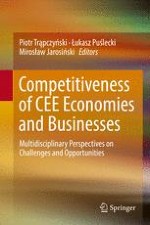2016 | OriginalPaper | Buchkapitel
Attracting FDI to the New EU Member States
verfasst von : Tomasz Dorożyński, Anetta Kuna-Marszałek
Erschienen in: Competitiveness of CEE Economies and Businesses
Aktivieren Sie unsere intelligente Suche, um passende Fachinhalte oder Patente zu finden.
Wählen Sie Textabschnitte aus um mit Künstlicher Intelligenz passenden Patente zu finden. powered by
Markieren Sie Textabschnitte, um KI-gestützt weitere passende Inhalte zu finden. powered by
